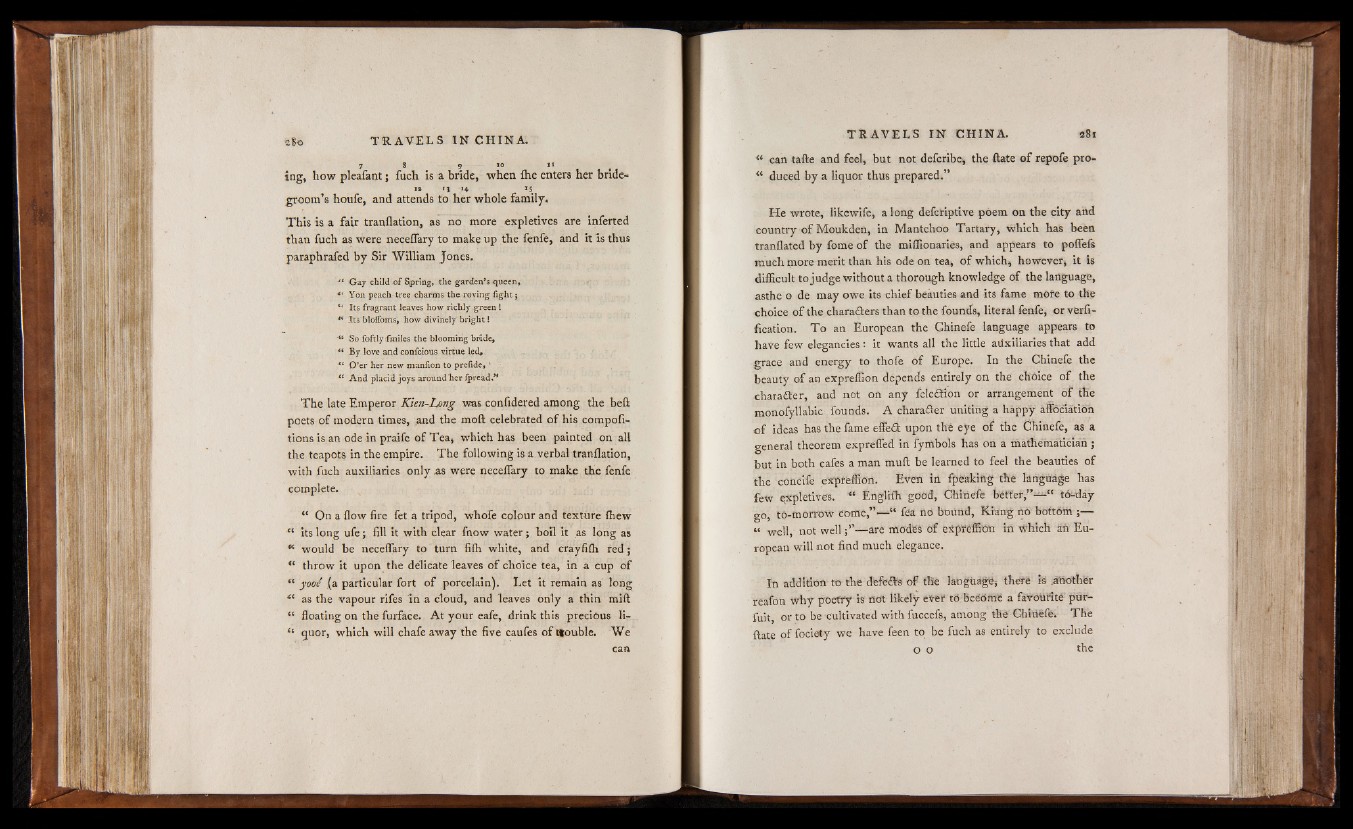
7 8 9 IO II
ing, how pleafant; fuch is a bride, when Ihe enters her brlde-
1» 11 '4 1S4
groom’s houfe, and attends to her whole family.
T h is is a fair tranflation, as no more expletives are inferted
than fuch as were neceflary to make up the fenfe, and it is thus
paraphrafed by Sir William Jones.
Ji Gay child o f S,pring, the garden’ s queen,
f i Yon peach tree charms the roving fight;
ie Its fragrant leaves how richly green !
** Its bloffoms, how divinely bright!
u So foftly fmiles the bloommg bride,
f i By love and confdous virtue led,
“ O’er her new manfion to prefide, v
“ And placid joys around her lprcad.”
T he late Emperor Kien-Long was confidered among the bell
poets o f modern times, .and the moft celebrated o f his compofi-
tions is an ode in praife o f Tea, which has been painted on all
the teapots in the empire. The following is a verbal tranflation,
with fuch auxiliaries only .as were neceflary to make the fenfe
complete.
“ On a flow fire fet a tripod, whofe colour and texture fhew
“ its long u fe ; fill it with clear fnow water; boil it as long as
K would be neceflary to turn fiih white, and crayfifh re d ;
“ throw it upon the delicate leaves o f choice tea, in a cup o f
“ yooe (a particular fort o f porcelain). Let it remain as long
■“ as the vapour rifes in a cloud, and leaves only a thin mill
“ floating on the furface. A t your eafe, drink this precious li-
“ quor, which will chafe away the five caufes o f ttouble. We
can
“ can tafte and feel, but not defcribe, the ftate o f repofe pro-
“ duced by a liquor thus prepared.”
He wrote, likewife, a long defcriptive pòem on the city and
country o f Moukden, in Mantchoo Tartary, which has been
tranflated by fome o f the miflionariés, and appears to poflefs
much more merit than his odeon tea, o f which, however, it is
difficult to judge without a thorough knowledge o f the language,
asthe o de may owe its chief beauties and its fame mote to the
choice o f the charaders than to the founds, literal fenfe, or verfi-
fication. T o an European the Ghinefe language appears to
have few elegancies • it wants all the little auxiliaries that add
grace and energy to thofe o f Europe. In the Chinefe the
beauty o f an expreffion depends entirely on the choice o f the
charade r, and not on any feledion or arrangement o f the
monofyllabic founds. A charafter uniting a hàppy àflSciàtion
o f ideas has the fame effed upon thé eye o f the Chinefe, as a
general theorem exprefled iti fymbols has on a mathematician ;
but in both cafes a man muft be learned to feel the beauties o f
the cohcife expreffion. Even in fpeaking thé lafrgtfàge has
few qxpletives. M Engliih good, Chinefe better,” — “ tó^-day
go, to-morrow Come,” — “ fëa no bound, Kiang nò bottóm ;—
“ well, not well — are modes o f eXpïéffiôti in Which an European
will not find much elegance.
In addition to the defeds o f the langüàge, there & another
reafon why poetry is not likely eVfef to bedOmé a favourite' pür-
fuit, or to be cultivated with fuccefs, among the Chinefe-. The
ftate o f foci et y we have feen to be fuch as entirely to exclude
0 0 the